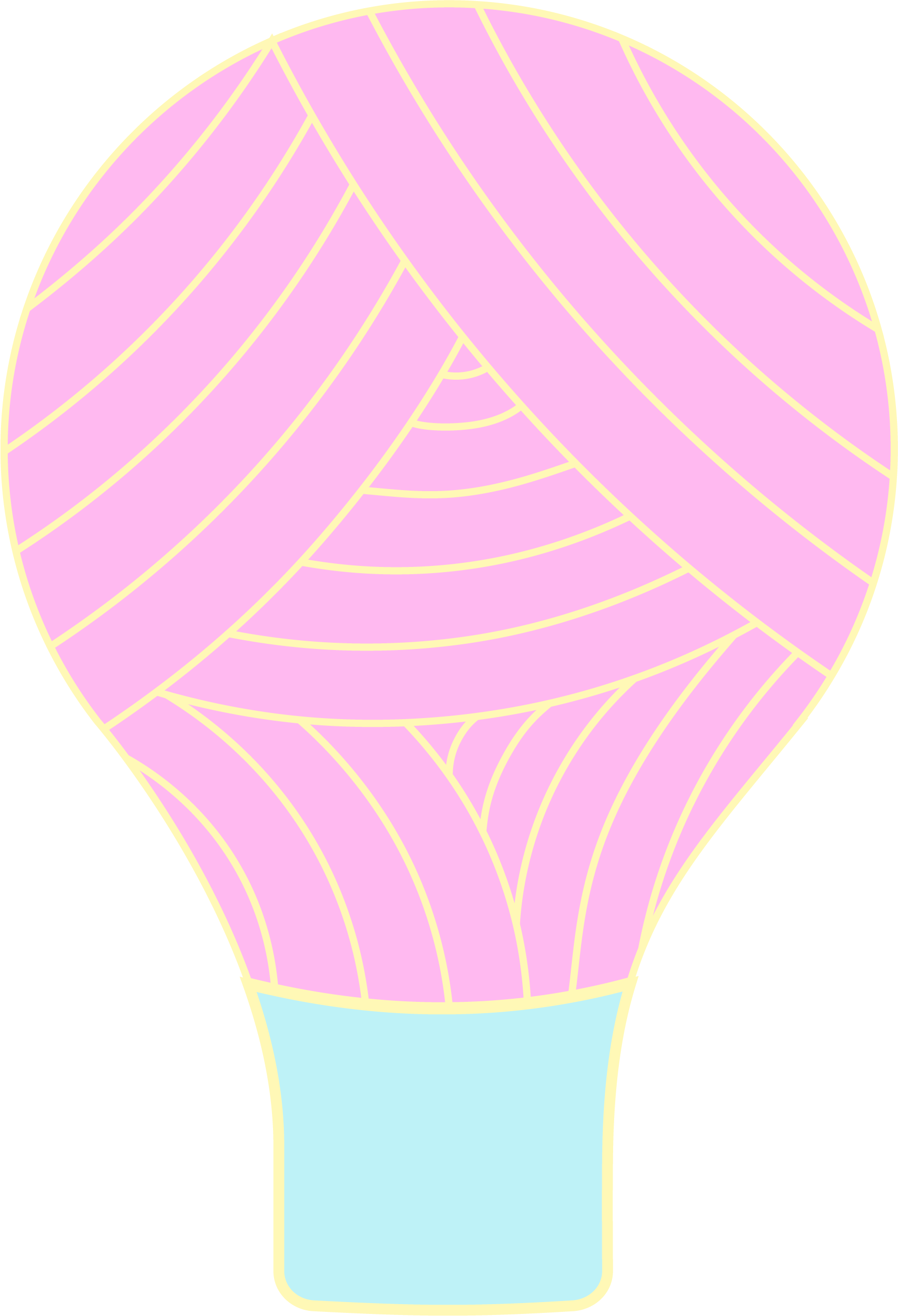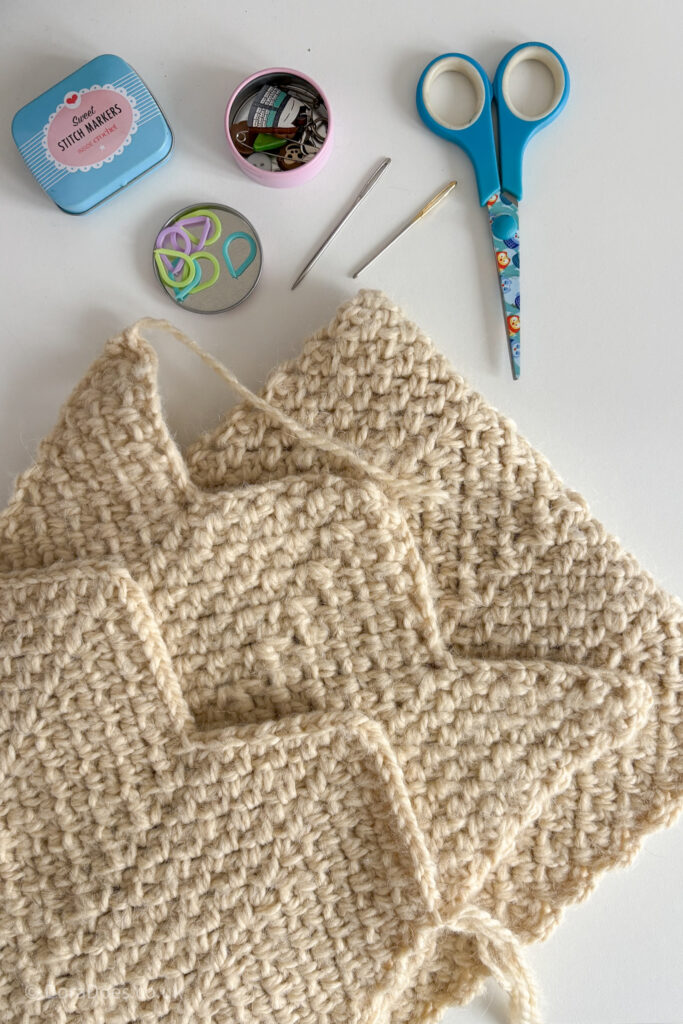Chevron and on: A free crochet infinity scarf pattern in 3 yarn weights
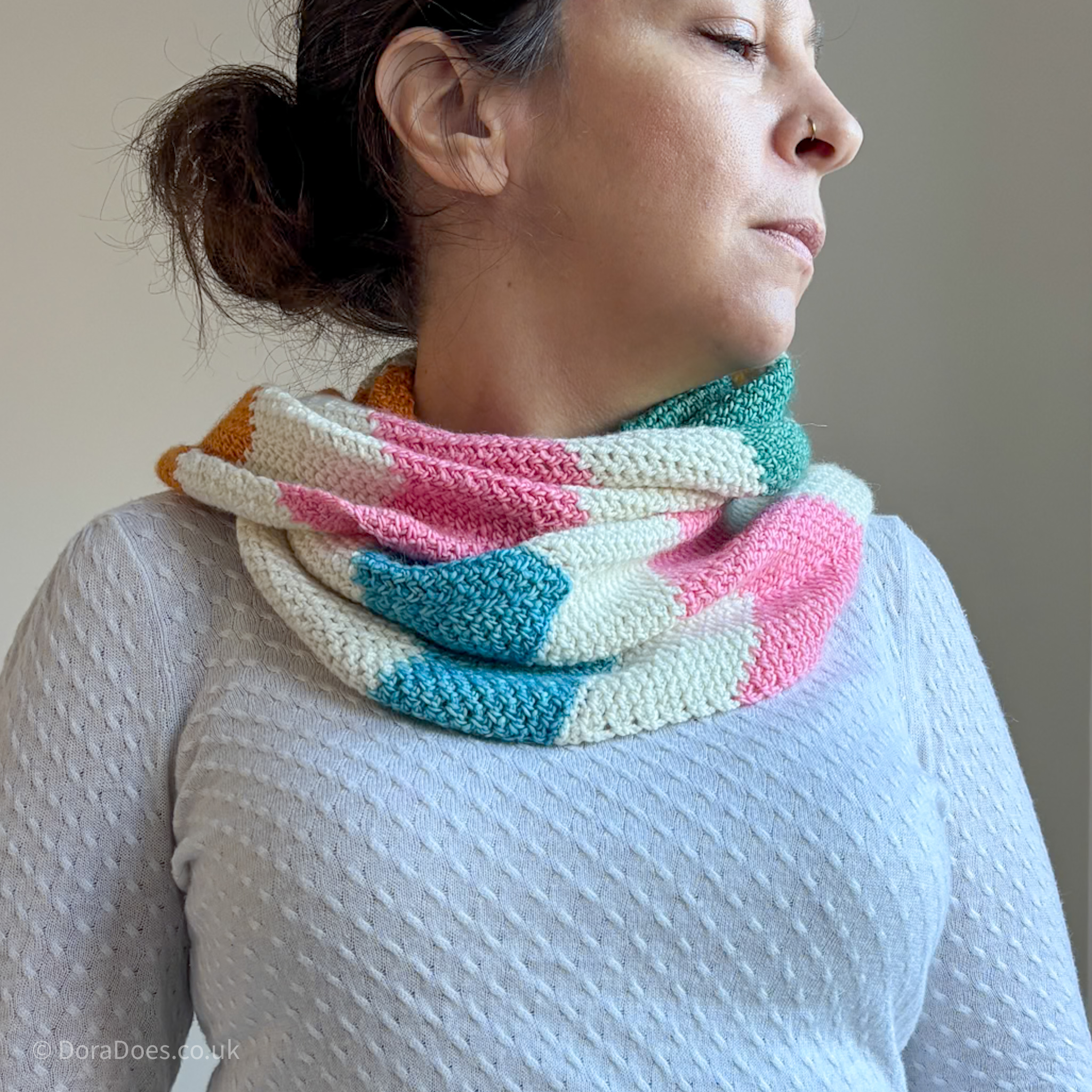
This simple, relaxing crochet pattern uses moss stitch chevrons to create a cozy infinity scarf. The pattern is offered in 3 yarn weights (written as a separate pattern for each); fingering weight (category 2), double knit (category 3) and Aran or heavy worsted (category 4).
Purchase the PDF, printable version of this pattern from Etsy, Ravelry or Love crafts or read on for the free version.

This post contains affiliate links. This means if you click a link to a product and go on to make a purchase, I receive a small percentage of the sale at no extra cost to you. You can read my full affiliate disclosure here.
The Chevron and on infinity scarf pattern one started as a double knit design (the one in the middle of the picture above), and let’s just say that things escalated… and now it’s available in 3 yarn weights instead.
If you’ve seen some of my designs before, you may know that I love designing crochet patterns for multiple yarn weights (like the fisherman’s winter hat, the any yarn will do cardigan and sweater patterns), so this may not come as a surprise!
You can also adjust the pattern to create a cowl, infinity scarf or open scarf by crocheting different numbers of chevrons to suit your length preferences and joining the two ends or leaving them open.
Below, you can see a close up of each of the samples in fingering weight, double knit and aran weight yarn respectively so you can easily compare one after the other:
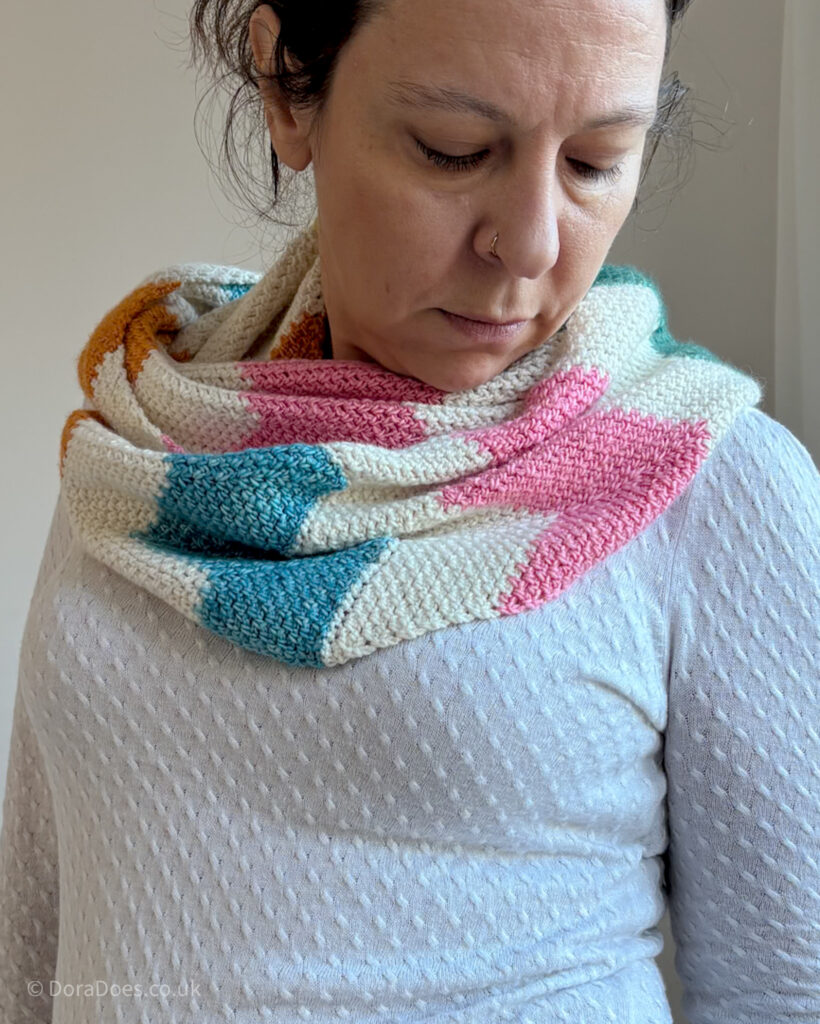
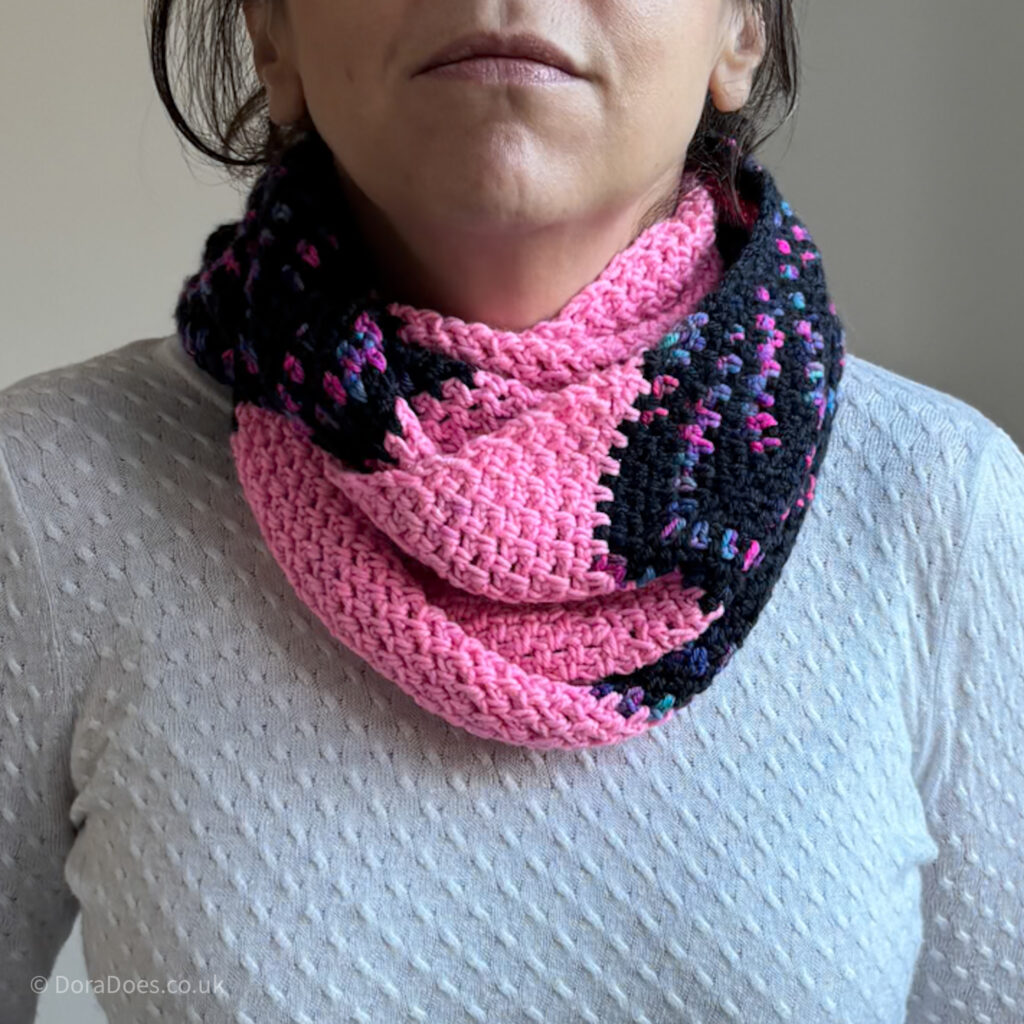
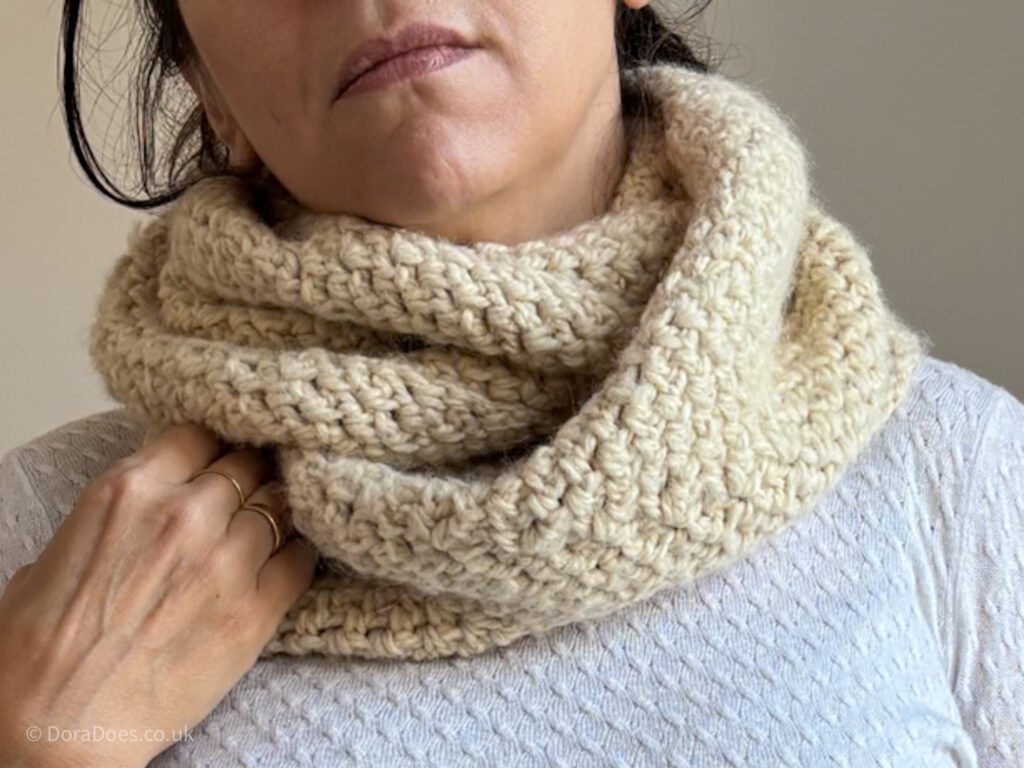
And now, let’s dive into the pattern!
Pattern Notes
General Notes
- Please read through the pattern and all associated notes before starting your project
- This pattern uses standard US crochet terms (UK equivalents are given in brackets in the abbreviations list where applicable)
- The crochet pattern is offered for 3 yarn weights (fingering weight, double knit and aran weight), with each one written as a separate pattern
- Numbers at the end of a row indicate the number of stitches in that row – in this pattern the stitch count does not change after the first row
- Chain 2 turning chains count as 1 single crochet and a chain 1 space throughout
- Chain spaces are included in the stitch count
- Instructions written after *asterisks should be repeated as indicated
- Instructions written between [square brackets] should be worked the specific number of times instructed
- Instructions in (round brackets) should be worked in the same place
- Right and Wrong sides are nominal
Construction
- The scarf is worked in rows along the short side – the number of stitches relate to the width of the scarf and the number of rows relate to its length
- Once the desired length is reached, you will block your scarf, fold it in half and sew together the two ends to form the loop of the infinity scarf (tutorial here)
- I have indicated which rows to work in which colours to achieve the look of the samples pictured, but you can adjust the cadence of your colour changes to your preference
- When changing colours, I encourage you to join the new yarn in the last pull through of the last stitch of the previous row
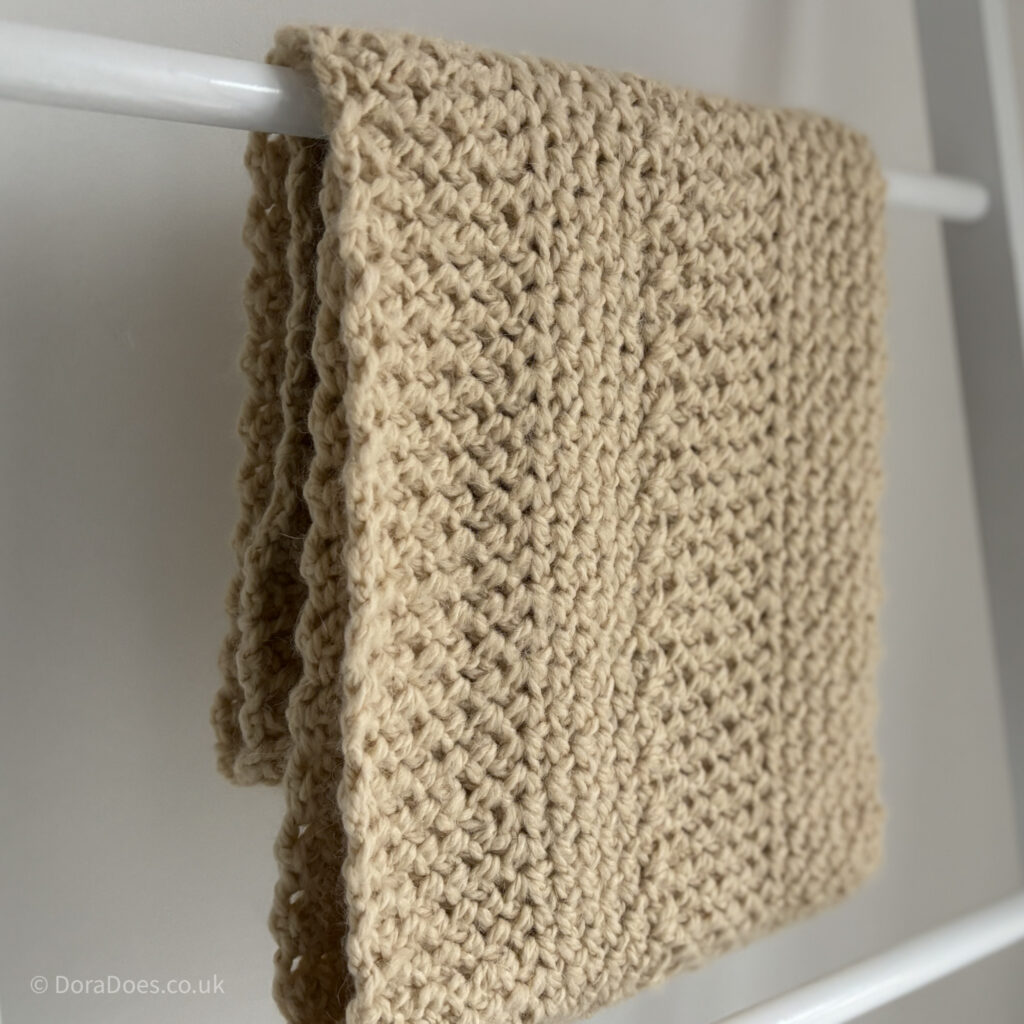
Skills Used
- Knowledge of basic crochet stitches, techniques and terminology is assumed
- Working in rows, simple increases, decreases and changing colours
- This is a relatively simple pattern using the ever popular moss stitch in a chevron pattern
- You may wish to use stitch markers to mark the peak and trough of each chevron to help you identify where to place the increases and decreases respectively
- Mattress stitch is used to sew the two ends together as demonstrated in this tutorial
- I created a video tutorial to accompany the pattern, which demonstrates the row repeat – watch the Right handed tutorial here and the Left handed tutorial here
- You can also find a playlist of shorts on the Dora Does youtube channel which show the creation of the fingering weight sample and include lots of other tips.
Materials
Fingering weight version
Hook: 4mm crochet hook, or size needed to obtain gauge. I used my clover amour hook.
Yarn: You will need around 180-200g/660-720m of fingering weight/4 ply or category 2 yarn.
To create the version pictured, I used 1 x 100g skein of Laxaton’s fingering weight merino wool (100g=365m) for Yarn A, and a mini skein set from Studio Evig containing 5 x 20g minis, 100% superwash merino (100g=366m/20g=73m), colourway ‘fruit pastels’ for Yarns B-F; Yarn B (pink), Yarn C (green), Yarn D (yellow), Yarn E (blue) and Yarn F (orange).
On the second repeat of the pattern, I switched the orange and blue around.
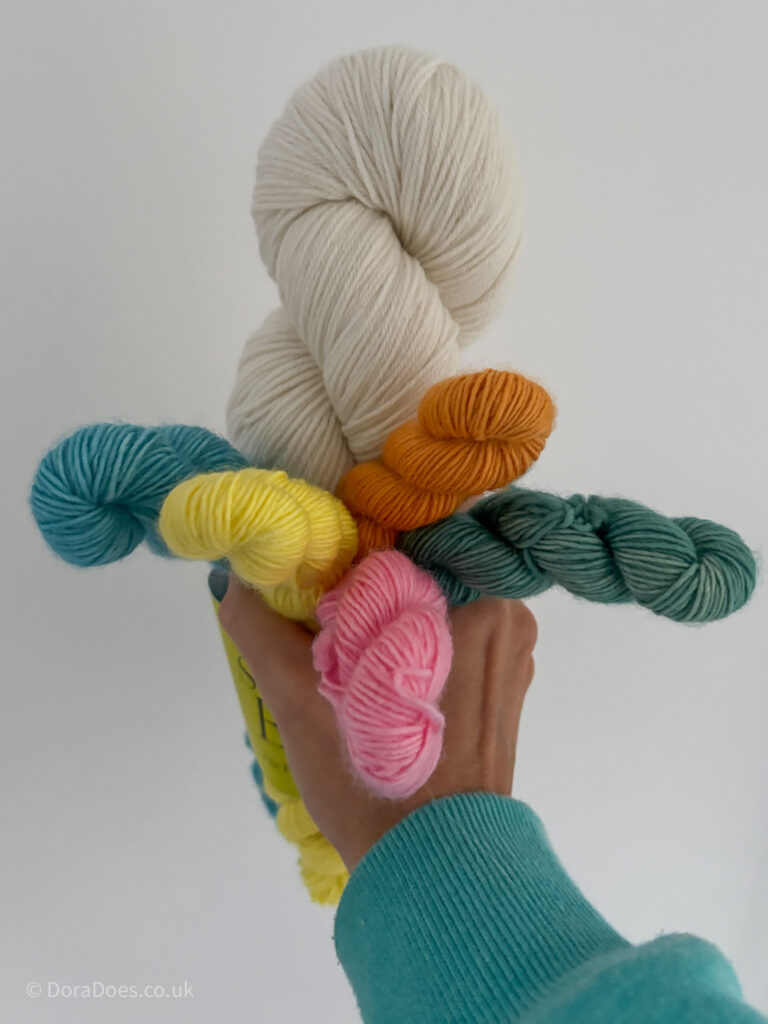
Double knit version
Hook: 5mm crochet hook, or size needed to obtain gauge. I used my clover amour hook.
Yarn: You will need around 200g/450m of double knit (dk) or category 3 yarn.
The sample pictured used 2 x100g skeins of hand-dyed merino wool from by Made by Penguins:
Yarn A: Black variegated yarn – 100% Superwash Merino (100g=225m).
Yarn B: Pink Sparkle – 75% Superwash Merino, 20% Nylon and 5% Metallic (100g=212m).
I used the same amount of each of two colours for wide, even stripes. This was quite a plump double knit yarn, so a light worsted may create a similar size scarf, but you’ll need to match gauge to check.

Aran / heavy worsted weight version
Hook: 7mm crochet hook, or size needed to obtain gauge. I used my clover amour hook.
Yarn: You will need around 200g/340m heavy worsted weight, aran weight or category 4 yarn.
The version pictured used 2 x100g balls of Hobbycraft’s Leader of the Pac, 90% Acrylic, 10% Alpaca (100g=170m).
Because of the fluffy halo on this yarn (from the alpaca), it’s quite a heavy aran (hence the 7mm hook) so lighter aran weights or worsted weights may create a smaller scarf. Match gauge to achieve the same size.
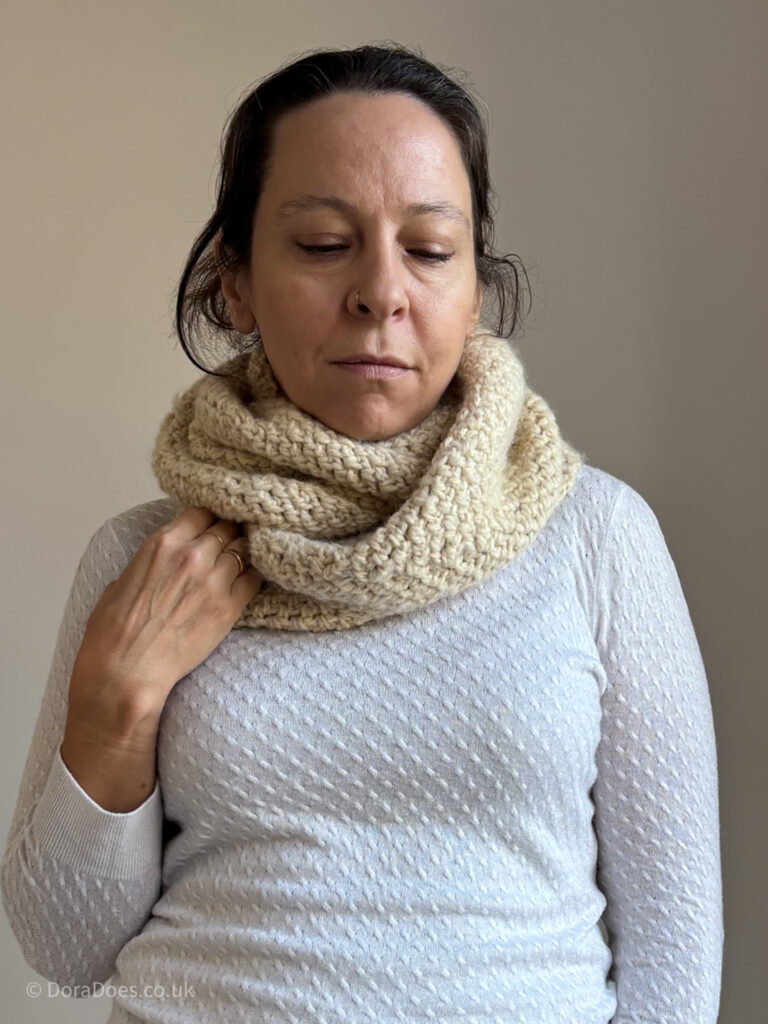
Yarn Substitution Options
This crochet project will work with a variety yarns in different fibres and colours. It’s a great stash busting pattern, or a fun way to use mini skeins (perhaps from yarn advents?). You can use whatever you have available and create different or asymmetric stripe widths too.
Over the three samples, I used different colour combinations, including using just one colour, to give you an idea of what’s possible. I think the pattern could look great in a variegated yarn too, which might create some interesting pooling patterns. The black variegated yarn in the double knit sample gives an indication of what this might look like.
Below you see the yarns used in their skein form to get an idea of where the samples started.
Different fibres and yarns will produce a different finished result. You may find this post useful when choosing yarn.
Other Materials & Notions
Yarn needle, scissors and a tape measure
I encourage you to block this project and recommend using a Blocking Board and T-pins. Learn more about blocking here.
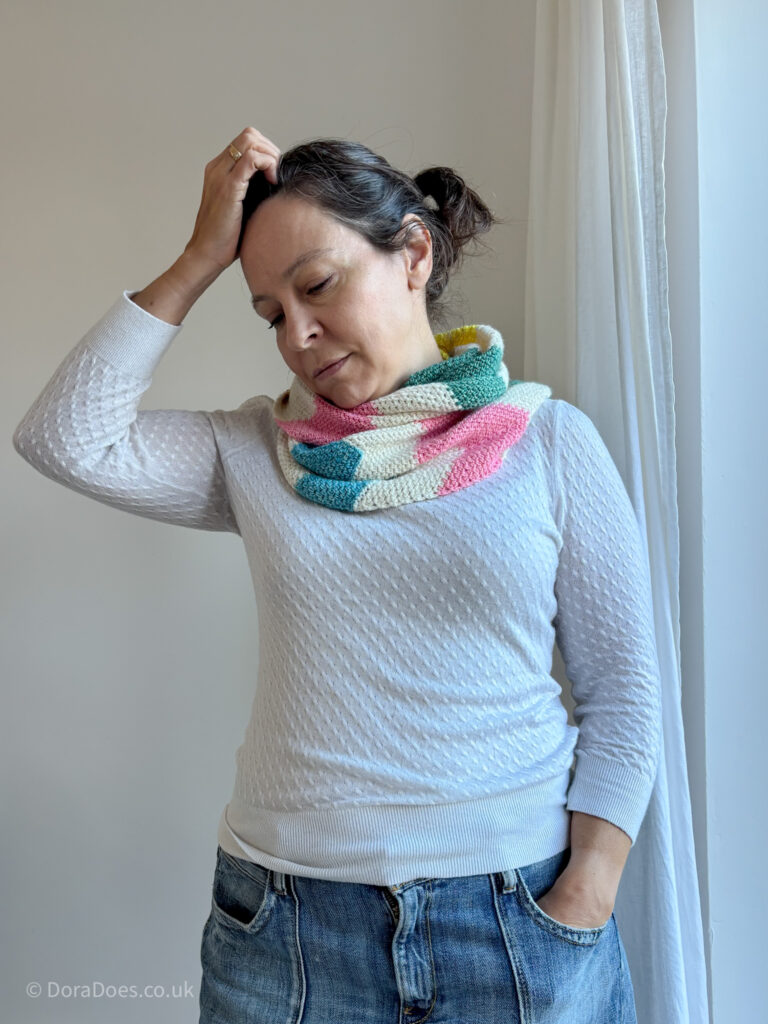
Finished Sizes & Adjustments
You may notice a slight curl at the edges of your scarf as you work. This can be flattened out by blocking. The scarf is offered in one adult size. Below I give the finished measurements (after a gentle blocking) of each of the samples, as well as some guidance for adjusting the sizes.
Finished measurements
Approximate measurements of the finished, blocked scarves are given below:
- The fingering weight scarf measures 130cm/51.5in long by 23.5cm/9.5in wide
- The double knit scarf measures 105cm/42in long by 25cm/10in wide
- The aran weight scarf measures 115cm/46in long by 25cm/10in wide
Adjusting the size
You can change the length of any of the scarves by crocheting more or fewer rows.
I offer guidance on the sizing of crochet (infinity) scarves and cowls in the sizing sections on my blog posts ‘all about scarves’ and ‘all about cowls.’
Changing the width of the scarf is more complex due to the nature of the pattern repeat. You could work with a pattern for a different yarn weight to achieve a different size scarf. For example, if you followed the double knit pattern using fingering weight, your scarf would be smaller, if you followed the double knit pattern using aran weight, your scarf would be larger.
Making a scarf or cowl in this pattern
It is also easy to adjust this pattern to create a classic, open scarf or a smaller cowl:
To make a scarf, I would work more rows so that your piece measures at least 150cm (which is my preferred minimum scarf length – learn more about crochet scarves and sizing here). Block the finished piece and do not sew the ends together.
To make a cowl, crochet fewer rows, ensuring your piece is around 60cm or your preferred cowl size. Block your work then join the ends together as per the infinity scarf instructions.
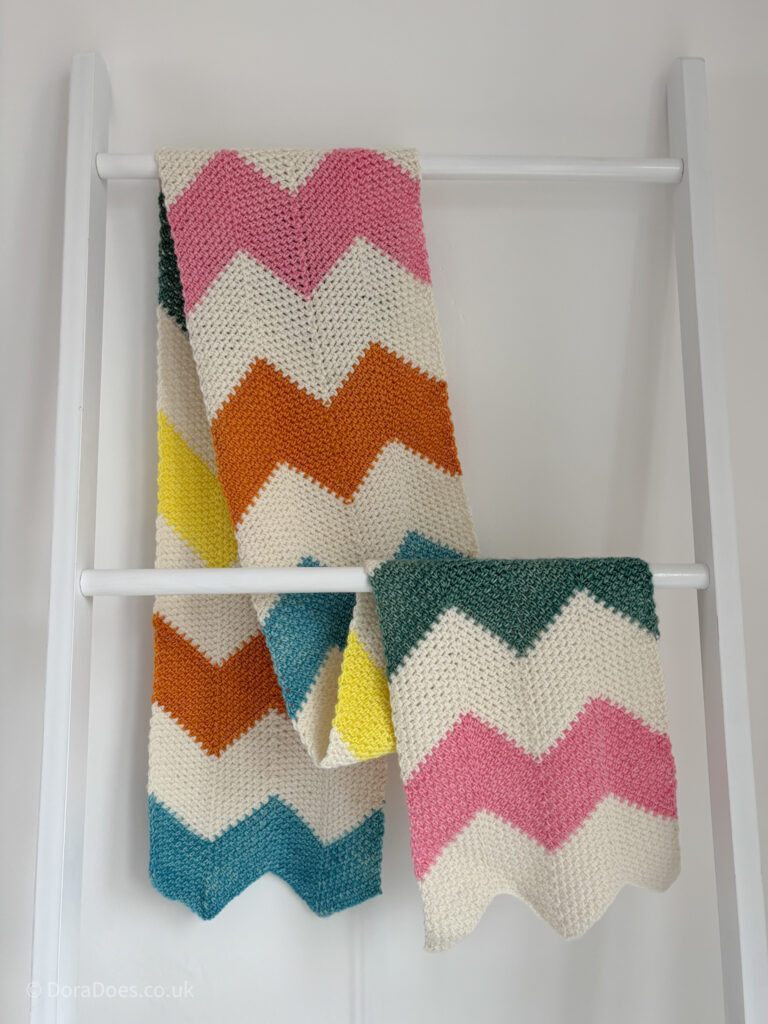
Stitches & Abbreviations: US terms
(UK Equivalent in Brackets)
- ch = chain
- ch-sp = chain space
- split sc2tog = split single crochet 2 together (UK split double crochet 2 together) – see special stitches
- rep = repeat
- sc = single crochet (UK double crochet)
- sk = skip (UK miss)
- sp(s) = space(es)
- st(s) = stitch(es)
- yo = yarn over
Special Stitches
Split Single Crochet 2 Together (split sc2tog )
Insert hook, yo, pull up a loop (2 loops on hook), sk next st, insert hook, yo, pull up a loop (3 loops on hook), yo, pull through all 3 loops to complete the stitch.
In this pattern you will work your split sc2tog over two chain spaces. You simply skip the single crochet between the two chain 1 spaces to complete the decrease at the base of the chevron.
You can see a demonstration of the split single crochet worked in the row repeat tutorial for this pattern. Right handed tutorial here and Left handed tutorial here.
How to purchase a Dora Does crochet pattern:
I sell my PDF crochet patterns in my Etsy, Ravelry and Love Crafts stores. You can purchase this pattern on any of these platforms, depending on your preference. Simply click the relevant links throughout this pattern page to be taken to the listing, or visit the store homepages in the links at the start of this paragraph.
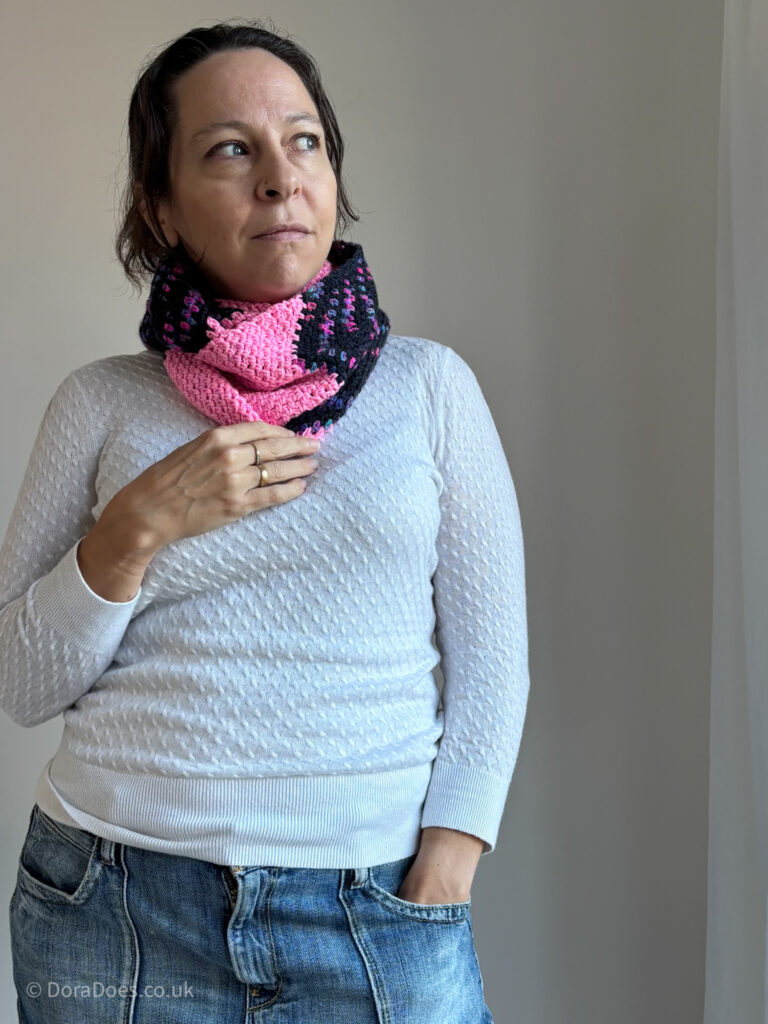
Gauge
Gauge measurements are given before blocking. Blocked sizes can be seen in the measurements sections. You may wish to block your swatch to get an idea of how much your project will change in size (which will depend on the fibre you’re using as well as your tension). This stitch pattern can grow in length or width depending on how you go about blocking it.
Gauge for fingering weight
30 sts and 22 rows in 10cm/4in of moss st (unblocked and measured on the diagonal of the chevrons) using a 4mm hook or size required to obtain tension.
Gauge for double knit
20 sts and 14 rows in 10cm/4in of moss st (unblocked and measured on the diagonal of the chevrons) using a 5mm hook or size required to obtain tension.
Gauge for aran weight
16 sts and 10 rows in 10cm/4in of moss st (unblocked and measured on the diagonal of the chevrons) using a 7mm hook or size required to obtain tension.
Whilst matching gauge isn’t absolutely essential for this project, variation in gauge will lead to a variation in the finished size, drape and look of your project. You can make a gauge swatch by following the aran weight pattern until it reaches 15cm in length (Make row 1 then repeat row 2). Learn how to make and measure a gauge swatch here
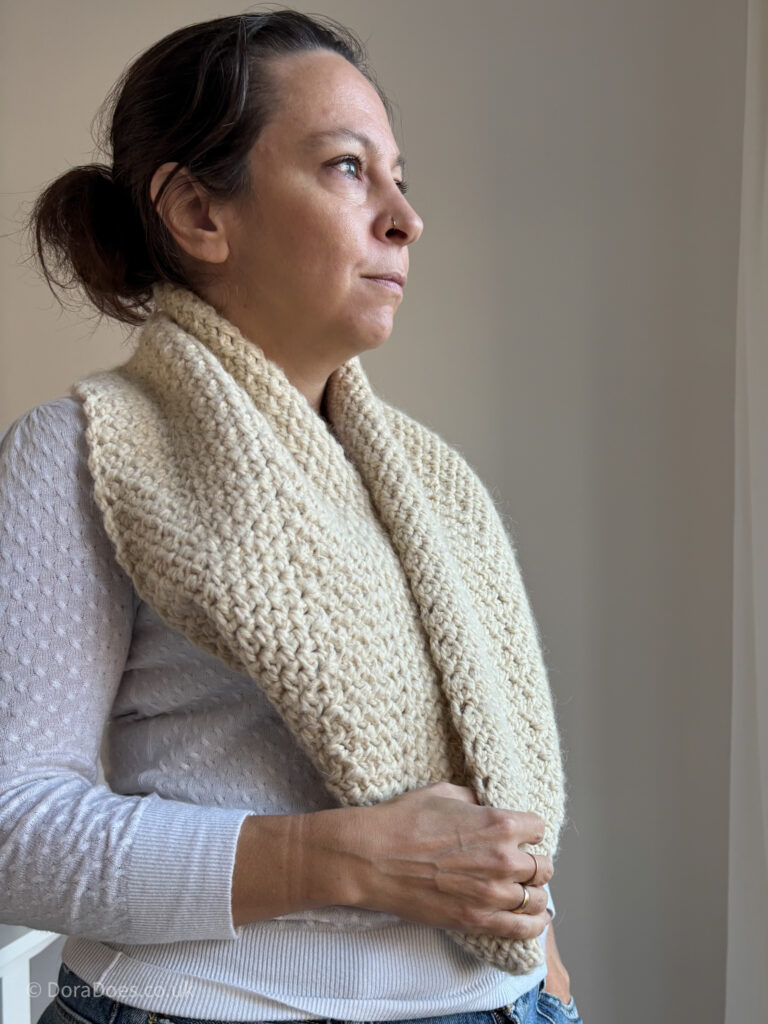
Chevron and on infinity scarf pattern
Below you will find three versions of the ‘Chevron and on’ crochet infinity scarf pattern; the fingering weight, the double knit and the aran weight in that order. In each case I have written the pattern with colour changes I used to achieve the versions pictured.
Pattern Tip: It might help you to know that for the majority of the pattern (except Row 1), single crochets are worked in chain spaces, not into the top of other stitches.
A reminder that you can find a video tutorial for the row repeat on my youtube channel: Right-handed version here and (left-handed version here)
Read on for the free pattern or purchase the print optimised ad-free PDF version on Etsy, Ravelry or Love Crafts.
‘Chevron and on’ in fingering weight yarn
Using Yarn A;
Ch73.
Row 1: 1sc in third ch from hook (the missed ch2 counts as 1sc and a ch1-sp), *ch1, sk 1 ch, 1sc in next ch; rep from * to end, turn. 73 sts
Row 2: Ch2 (counts as 1sc and ch1 throughout), sk the first 3 sts (that’s the first sc, the first ch1-sp and the second sc you’ll skip), 1sc in second ch1-sp, [ch1, sk next sc, 1sc in next ch1-sp] seven times, ch1, sk next sc, (1sc, ch1, 1sc) in next ch1-sp, [ch1, sk next sc, 1sc in next ch1-sp] seven times, ch1, sk next sc, split sc2tog over next 2 ch1-sps (see special stitches), [ch1, sk next sc, 1sc in next ch1-sp] seven times, ch1, sk next sc, (1sc, ch1, 1sc) in next ch1-sp, [ch1, sk next sc, 1sc in next ch1-sp] nine times (the last sc will be made into the ch2-sp at the beginning of the previous row), turn. 73 sts
Rows 3-14: As Row 2
Change to Yarn B
You will continue to repeat Row 2, changing colours every 14 rows in the order below:
Rows 15-28: Rep Row 2 in Yarn B
Rows 29-42: Rep Row 2 in Yarn A
Rows 43-56: Rep Row 2 in Yarn C
Rows 57-70: Rep Row 2 in Yarn A
Rows 71-84: Rep Row 2 in Yarn D
Rows 85-98: Rep Row 2 in Yarn A
Rows 99-112: Rep Row 2 in Yarn E
Rows 113-126: Rep Row 2 in Yarn A
Rows 127-140: Rep Row 2 in Yarn F
Rows 141-154: Rep Row 2 in Yarn A
Rows 155-280: Rep Rows 15-140 (rep the colour order once more finishing on Yarn F)
Fasten off, leaving a long tail (approx 3x the width of the scarf) and continue to Joining and Finishing

‘Chevron and on’ in double knit yarn
Using Yarn A;
Ch65.
Row 1: 1sc in third ch from hook (the missed ch2 counts as 1sc and a ch1-sp), *ch1, sk 1 ch, 1sc in next ch; rep from * to end, turn. 65 sts
Row 2: Ch2 (counts as 1sc and ch1 throughout), sk the first 3 sts (that’s the first sc, the first ch1-sp and the second sc you’ll skip), 1sc in second ch1-sp, [ch1, sk next sc, 1sc in next ch1-sp] six times, ch1, sk next sc, (1sc, ch1, 1sc) in next ch1-sp, [ch1, sk next sc, 1sc in next ch1-sp] six times, ch1, sk next sc, split sc2tog over next 2 ch1-sps (see special stitches), [ch1, sk next sc, 1sc in next ch1-sp] six times, ch1, sk next sc, (1sc, ch1, 1sc) in next ch1-sp, [ch1, sk next sc, 1sc in next ch1-sp] eight times (the last sc will be made into the ch2-sp at the beginning of the previous row), turn
Rows 3-22: As Row 2
Change to Yarn B
You will continue to repeat Row 2, alternating between Yarn A and Yarn B every 22 rows, in the order below:
Rows 23-44: Rep Row 2 in Yarn B
Rows 45-66: Rep Row 2 in Yarn A
Rows 67-88: Rep Row 2 in Yarn B
Rows 89-110: Rep Row 2 in Yarn A
Rows 111-132: Rep Row 2 in Yarn B
Fasten off, leaving a long tail (approx 3x the width of the scarf) and continue to Joining and Finishing

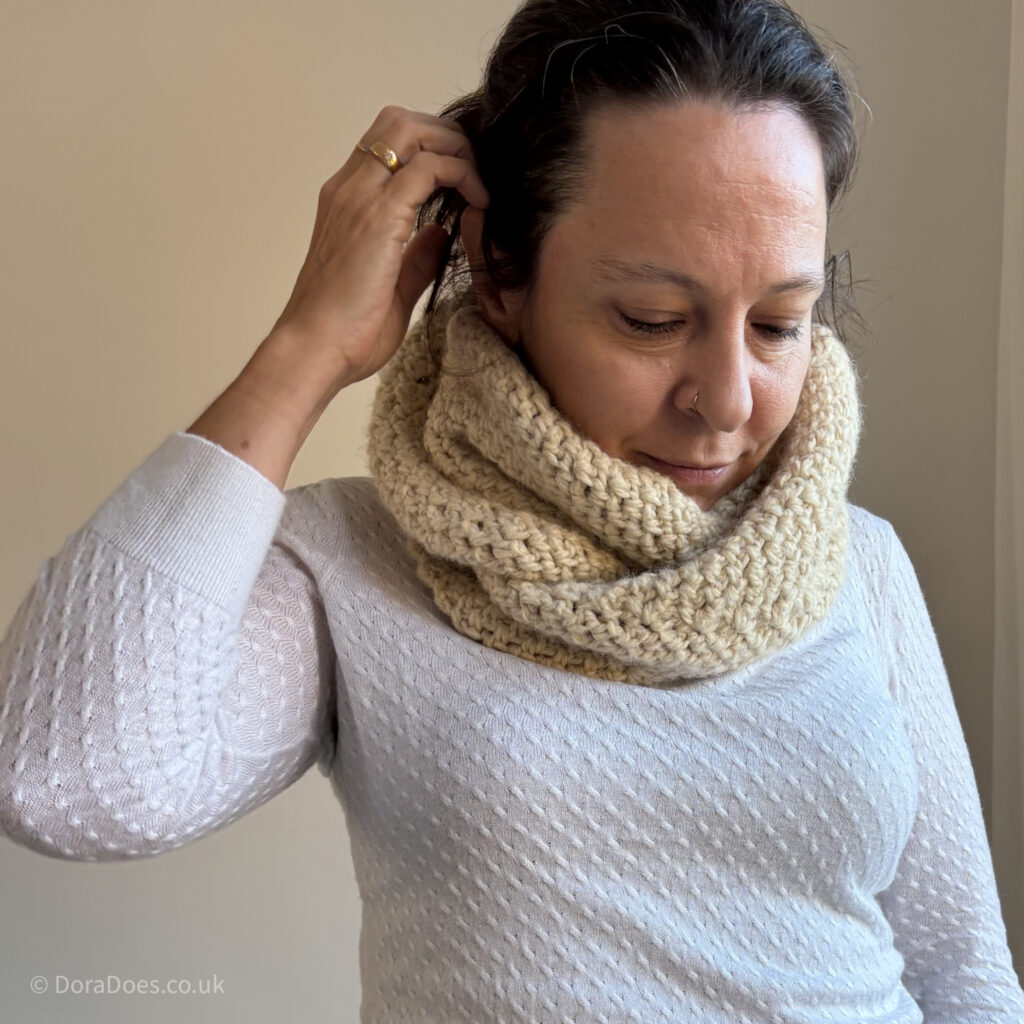
‘Chevron and on’ in aran weight yarn
Ch49;
Row 1: 1sc in third ch from hook (the missed ch2 counts as 1sc and ch1-sp), *ch1, sk 1 ch, 1sc in next ch; rep from * to end, turn. 49 sts
Row 2: Ch2 (counts as 1sc and ch1 throughout), sk the first 3 sts (that’s the first sc, the first ch1-sp and the second sc you’ll skip), 1sc in second ch1-sp, [ch1, sk next sc, 1sc in next ch1-sp] four times, ch1, sk next sc, (1sc, ch1, 1sc) in next ch1-sp, [ch1, sk next sc, 1sc in next ch1-sp] four times, ch1, sk next sc, split sc2tog over next 2 ch1-sps (see special stitches), [ch1, sk next sc, 1sc in next ch1-sp] four times, ch1, sk next sc, (1sc, ch1, 1sc) in next ch1-sp, [ch1, sk next sc, 1sc in next ch1-sp] six times (the last sc will be made into the ch2-sp at the beginning of the previous row), turn. 49 sts
Rows 3-110: As Row 2
Fasten off, leaving a long tail (approx 3x the width of the scarf) and continue to Joining and Finishing
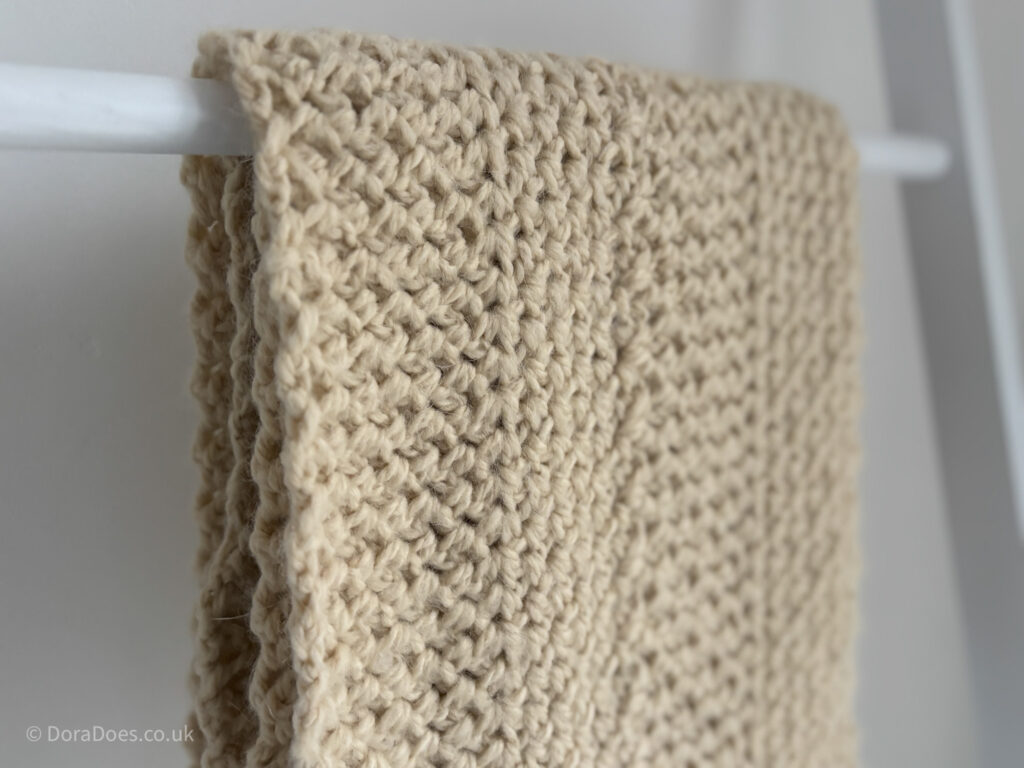
Joining & Finishing
I blocked the scarves before sewing in ends and joining the two sides together. This helped deal with the curling I got in the fingering weight version and evened out the pattern, relaxing the stitches.
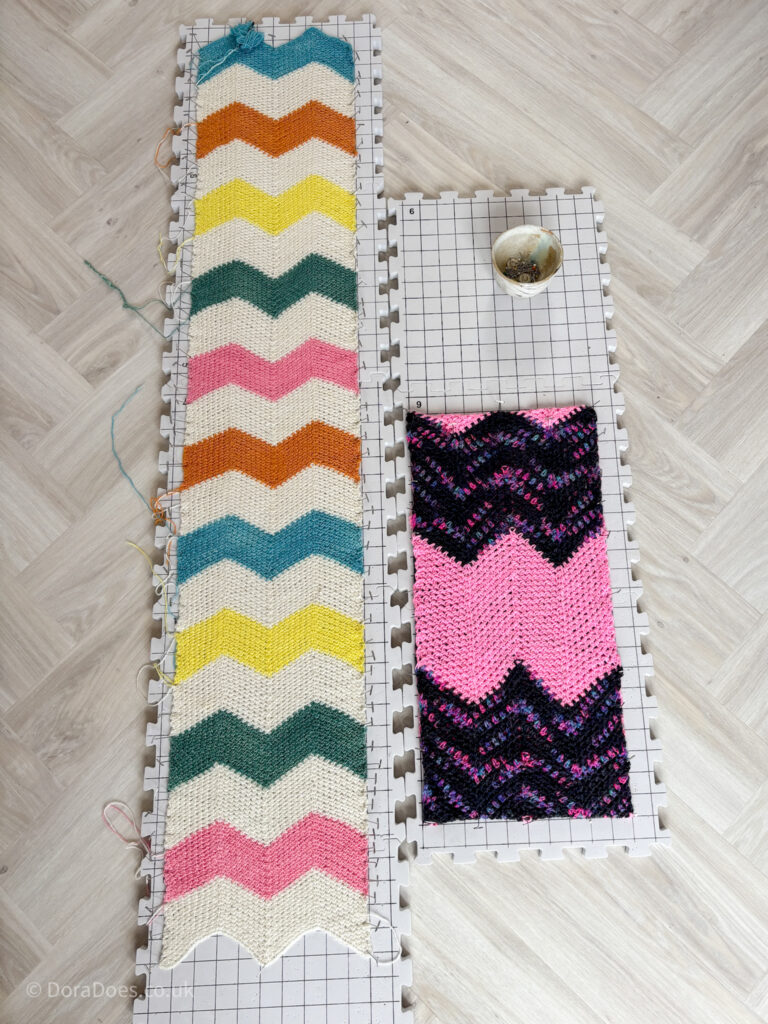
To join the two ends, thread the long tail you left at the end of the last row onto a yarn needle. Fold the scarf in half, fitting the two chevron ends together. Sew together the first and last row, joining stitch to corresponding stitch, using the mattress stitch.
This may feel a bit awkward but you will be slotting the chevrons into each other to create a continuous loop.This video demonstrates how I sewed together the chevron edges to create the infinity scarf using the aran weight sample as an example.
Note that in the fingering weight version, I decided to create a möbius strip by twisting the scarf once before joining. Because this scarf was longer, there was plenty of fabric to play with adding an extra twist.
Weave in remaining ends and enjoy your endless chevrons!
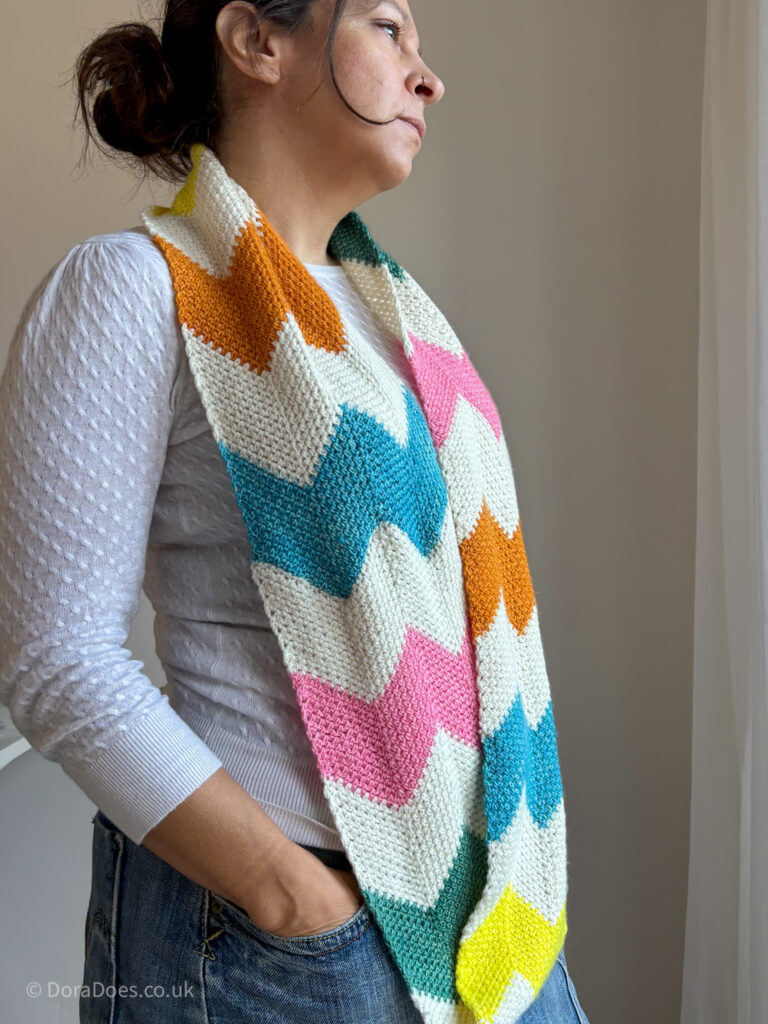
How to find me and share your finished makes
- On Instagram, you can use the hashtag #DoraDoes to share your finished projects or just tag me @doraexplored
- If you have the bug for creating garments, why not join my dedicated facebook group “My Crochet Wardrobe” and share them there?
- Sign up to the WiP Tip for weekly crochet chat, offers and exclusives straight to your inbox – click here to sign up.
Happy Hooking
Dx
More Crochet Scarf, Cowl and Shawl Patterns
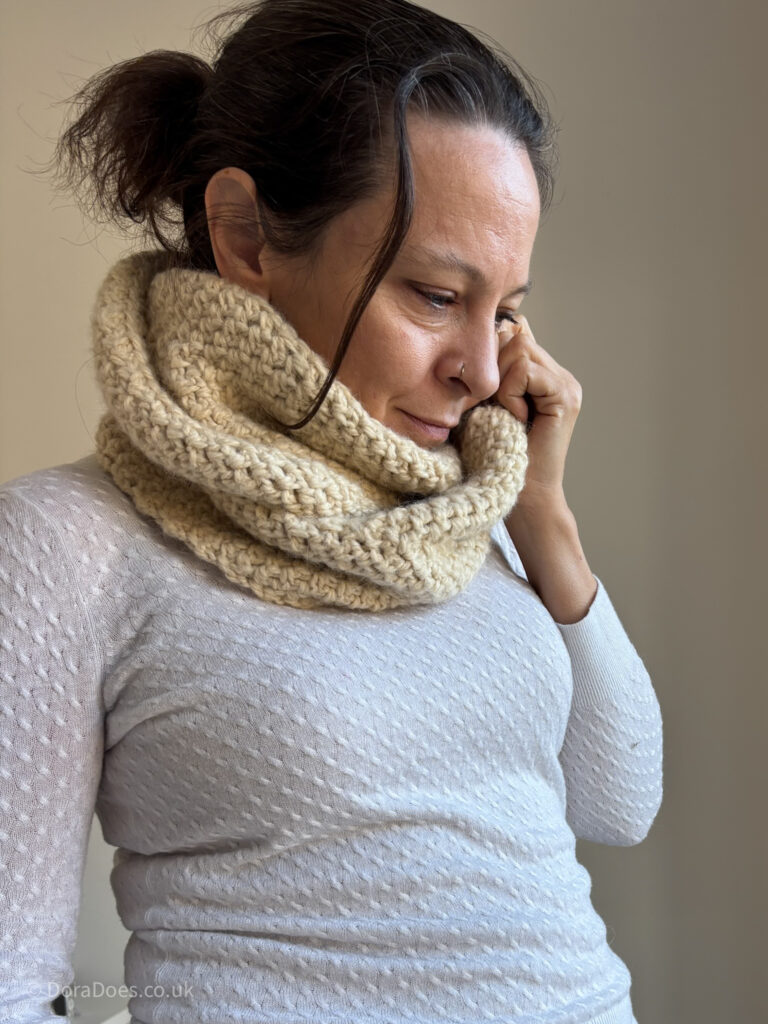
Copyright Dora Does Limited, Registered in England, Company Number 13992263. This pattern is for personal use only and may not be shared or reproduced in written, photo, video or any other form without prior written consent. All rights reserved. Terms of service.
